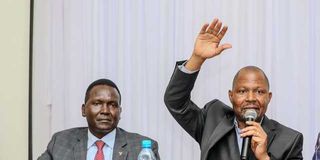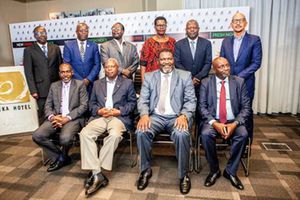
Outgoing National Olympic Committee of Kenya (NOC-K) President Paul Tergat (left) and IEBC County Elections Manager Albert Gogo during a stakeholders’ engagement meeting convened by IEBC in Nairobi yesterday ahead of the NOC-K polls set for tomorrow.
The National Olympic Committee of Kenya (NOC-K) elections, scheduled for Thursday at Pride Inn Hotel, Nairobi are in limbo.
The elections might not proceed as planned, with several federations — facing possible disqualification — on Tuesday seeking legal intervention at the Sports Dispute Tribunal (SDT).
Kenya Taekwondo Federation (KTF) chairman Suleiman Sumba has petitioned the SDT to interpret the current NOC-K Constitution in relation to the 2025 Elections Rules and Regulations.
Sumba, who is vying for an executive committee position, raised concerns over discrepancies between the two sets of rules.
The confusion intensified Tuesday when the Independent Electoral and Boundaries Commission (IEBC) met delegates and candidates to issue guidelines for the polls. The SDT is expected to rule on the matter today.
However, IEBC County Elections Manager Albert Gogo and Returning Officer Muthee Gakura emphasised that their role is strictly electoral and that they will not be drawn into NOC-K’s internal disputes.
But what will be supreme—the NOC-K Constitution or the 2025 Elections Rules and Regulations, which were adopted during the NOC-K General Assembly in December 2024?
Discrepancies between the two documents have led to IEBC blacklisting nine federations for failing to comply with the 2025 Elections Rules and Regulations.
These are: Football Kenya Federation, Kenya Handball Federation, Kenya Rowing and Canoe Federation, Kenya Taekwondo Federation, Kenya Volleyball Federation, Kenya Rugby Union, Softball Federation of Kenya, Kenya Triathlon Federation, and Baseball Federation of Kenya.
The NOC-K Constitution (Section 17.4) stipulates that nominations made by any voting member federation will be valid only if signed by the president and/or secretary general. Meanwhile, the 2025 Elections Rules and Regulations (Article 5.2) require each federation to be represented by two delegates—one of whom must be either the president or secretary general—with delegate names submitted by April 10, 2025.
Neither document explicitly states whether the president or secretary general holds voting rights, a loophole that has fuelled disputes in federations where chairmen/presidents and secretaries are at odds. In some cases, officials have nominated themselves for Congress positions without mutual endorsement.
A separate point of contention raised during the IEBC briefing involved the process of nomination seconding. NOC-K Constitution Article 17.3 stipulates that candidates must be nominated by their own federation and seconded by a delegate from another federation.
“That is why I went to SDT so that they can help us clarify these issues before the elections,” said Sumba, who has clashed with KTF secretary general George Wesonga. Wesonga declined to endorse Sumba despite his clearance by the executive committee.
KTF is among several federations embroiled in leadership wrangles, including Kenya Rugby Union, Kenya Triathlon Federation, Kenya Handball Federation, and Kenya Volleyball Federation. Notably, most chairmen/presidents from these federations support Shadrack Maluki’s camp, while the secretaries back Francis Mutuku.
Maluki, the outgoing first deputy president, and Mutuku, the outgoing secretary general, are vying to succeed Paul Tergat as NOC-K president.
Muthee reiterated that IEBC’s objective is inclusivity: “Our interest at IEBC is for an all-inclusive process. We are not interested in locking anyone out, but we can’t allow ourselves to be sucked into federations fighting,” he said. He added that federations with disputes have been given time to resolve their issues.
Mudibo, contesting for the secretary general position under Maluki’s camp, insisted that the NOC-K Constitution must prevail:
"We can’t work outside our constitution that is aligned with the Sports Act and the country’s constitution," said Mudibo. He dismissed the 2025 Elections Rules and Regulations and confirmed that they have written to IEBC on the matter.
Maluki similarly argued that the Constitution must supersede all else:
“The 2025 Elections Rules and Regulations came from the woods; hence NOC-K Constitution supersedes everything,” said Maluki.
Mutuku countered by pointing out that the elections rules were approved democratically by the General Assembly:
“Section 17.4 came to the General Assembly where instead of having the president and/or the secretary general sign for the voting member it was agreed that they both sign,” said Mutuku.
“This is a practical case where when you go to the bank the treasurer and any other sign the cheque; if not it won't be cashed,” he added.









